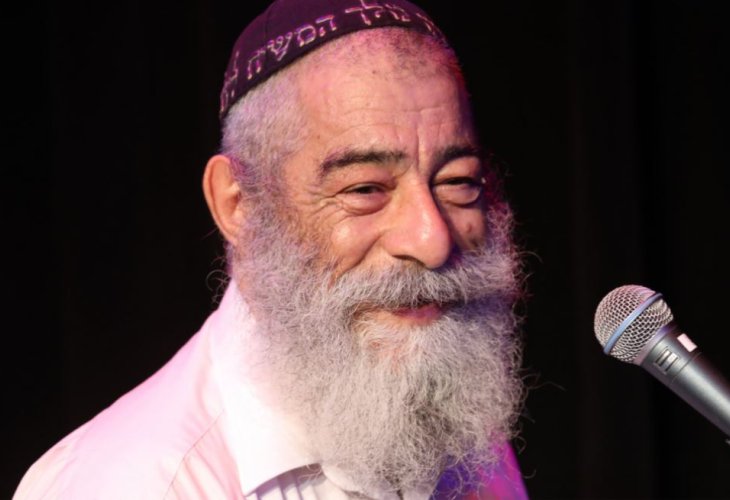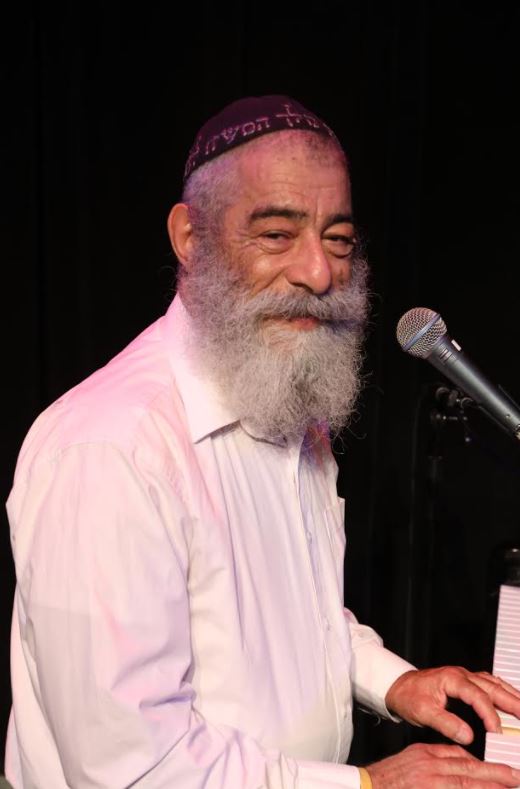Ariel Zilber Interview: "The State Forgot Holocaust Survivors; It's Our Duty to Help Them"
Ariel Zilber discusses the injustices faced by Holocaust survivors, challenges of aging, and his views on the COVID-19 pandemic.
 Photo: Roman Machlev
Photo: Roman Machlev"Donating to Holocaust survivors is extremely important," says Ariel Zilber, one of the top artists participating in a special broadcast on the Hidabroot channel, which will collect donations for the benefit of many Holocaust survivors. "First of all, it's important because charity is highly valued. Our sages teach us that charity saves lives, helping both the giver and the receiver. All of Israel are brothers, friends, and responsible for one another. We have a sacred duty to assist the weak in society. This is what mutual responsibility is about, and especially for Holocaust survivors, whose situation is known to be very dire."
"Thus, I find it very important that Hidabroot organizes this event, and I even think such fundraising should happen more frequently. I'm very pleased that it's Hidabroot organizing it because when you donate money, it's important it reaches those in need, not to people pocketing money along the way. Often, various associations contact me asking for donations, and I ask how much their manager earns. Most times, they can't tell me, and I don't donate. In contrast, I trust Hidabroot. They have a very good reputation as honest and decent people."
"Moreover," adds Zilber, focusing on the core of the broadcast, "it's especially important to help Holocaust survivors because the state has mistreated them. The state took a large portion of the compensation money that was supposed to be theirs, invested it in infrastructure development and other things, and forgot about them. The money was meant for them, but it never reached them. So we, the citizens, have to step up and contribute each according to their heart's ability. Whoever opens their heart and wallet for this cause will do well. The Holocaust was a terrible event, hard to describe. These people underwent what they did just because they were Jewish. Today, we need to carry them on our shoulders and offer them the best life we can give them."
 Photo: Roman Machlev
Photo: Roman Machlev"I Will Never Forgive the Chinese"
Speaking of a weakened economy, like many other artists, Zilber's livelihood has been severely affected since the outbreak of COVID-19. "The coronavirus has been with us for almost a year and has caused immense damage. Thank God I haven't contracted the virus or met any COVID-19 patients so far, but on a global scale, it has obviously created many problems. Personally, aside from almost completely halting my livelihood and that of those who work with me, and missing the synagogue greatly, the coronavirus has only been good for me."
"For example, the lack of physical contact, distancing, maintaining hygiene and cleanliness—I really appreciate that. I never liked hugging. It seems unnatural to me. You can greet nicely, but why must you touch? I didn’t even like shaking hands. When people started hugging, I hugged too, but I never liked it. Luckily, I live in Gittit, a moshav in the Jordan Valley, so there is space here. I have no idea how people living in high-rises manage."
How difficult was the blow to your performances?
"Economically, it was a very hard blow. We’re performing much less now, and when we do, it's small performances at homes or gardens or at most small weddings, so we live on savings and royalties. In terms of everything else, it's fine by me. I’m not specifically seeking big venues. I love performing everywhere, money was never important to me—even though music is my livelihood.
"About a year ago, I said I planned to stop performing, but people misunderstood me. I wanted to stop chasing things like PR investments, strategy, and marketing promotions. It's exhausting. I have more important things to invest in. I want to perform where and when I feel like it. For example, an evening of my mother’s songs, or an evening of my less successful songs that I believe should succeed. Generally, a singer selling tickets to a show needs to invest a lot for every ticket buyer, and I wanted to avoid that hassle."
"Overall, regarding what’s happening with performances, it’s clear to me that everything Hashem does is for good. I don’t always understand why, but I know it’s for good. Beyond divine schemes, in practical worldly terms, I believe China is responsible for this whole thing. I think they initiated it to overthrow Trump. I will never forgive them for that."
"For several months now, I haven’t purchased anything made in China, and I’ve thrown away everything I had that was made there. The Chinese are fighting against the whole world. Many things are made in China, after all, almost everything is made there, and Trump said he wanted to help America, not China, so he started pulling companies and factories out of there. For the Chinese, this was very hard, so they wanted him out and Biden in, who is much more favorable to them. The Chinese are the root of all evil. They're communists, and you simply shouldn’t deal with communists."
"77 and Feeling It"
Aside from Zilber's adaptation to life under the coronavirus, in recent years, he has also been adjusting to his physical condition, naturally weakening as is common for those approaching their 80s. "I'm 77, and I definitely feel it," he shares candidly. "Some people say they don’t feel their true age, but Ephraim Kishon s memory said it's not about how you feel—it's about your actual age. I may not totally feel 77, but age certainly shows its marks."z
"Nowadays, it's more challenging to bend, my sight is weakening and I need glasses, my right hand shakes a bit, I can't play the trumpet anymore—I really loved it but my breathing isn't the same, my lung strength isn't what it used to be, so I started playing the saxophone as it's simpler. I simply must play wind instruments. It's in my blood. And, of course, playing the piano and singing. To sum up, I'll quote Arik Einstein s memory: 'In old age, you do the same things, just slower.' Thank God my hearing is still excellent, and I don’t need hearing aids."z
When you became religious, some people raised an eyebrow and there were quite a few remarks. How do people view this today?
"Nowadays, there are still a few who say I've gone crazy, but most say to me: 'I wish I were like you. I wish I had the strength to become more religious.' All Israelis have faith. Today, no one isolates me because I became religious, but there are those who ostracize me because of my political views, which I don't hide. Beyond my right-wing views, which of course are part of what I'll say now, I believe we are in the midst of a war. There's a war between those who want a Jewish state here and those who don’t. For example, channels 11, 12, and 13 don't want Judaism. And not just them, of course, so when there's a war, you have to fight. Judaism is our life. We have nothing else but this. In the State of Israel, you can’t separate religion from state."
"Yes, I'm a soldier in this war. I hold right-wing views. I believe the whole of the Land of Israel belongs to the People of Israel and that there's no room for two peoples here. I believe that if we lived the way Jews are supposed to live, then another people would simply not be here. The People of Israel have always been divided, this is a war even from the times of Korach, the judges, Israel and Judah. Hellenists have always existed and always will. The important thing is not to surrender. I'm proud to be Jewish and happy to be Jewish. In addition to all this, I also, of course, fight in this war with music. I write and compose songs with important messages. Music has tremendous power, and I tried to harness it for the important things I spoke about now."

